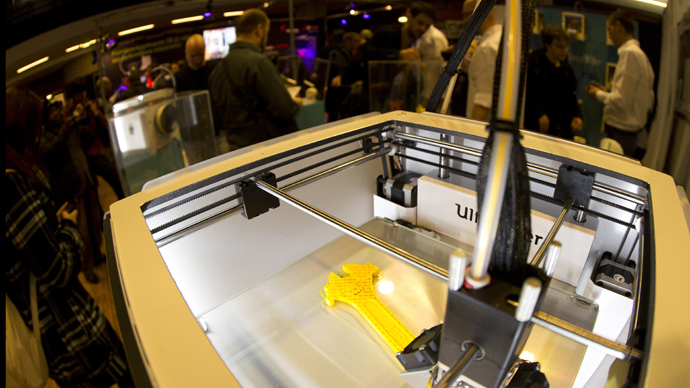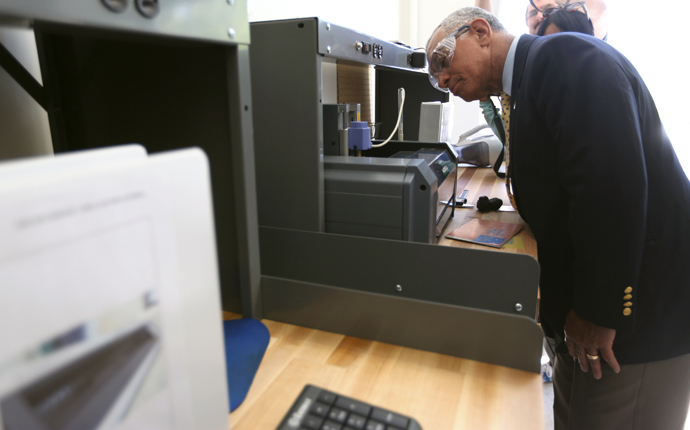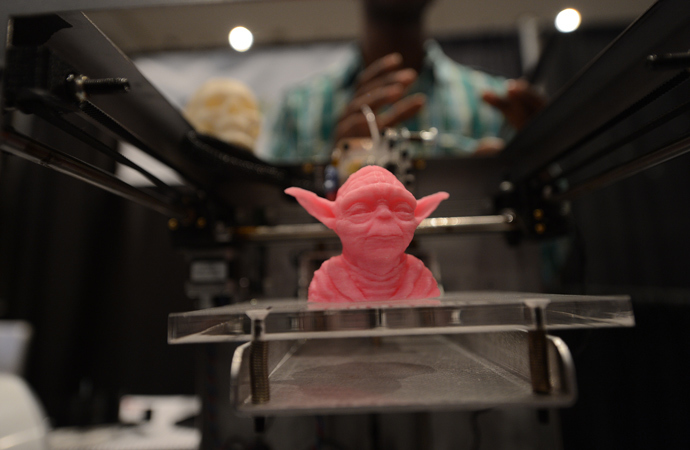3D printing to provoke a new twist in American gun control

3D printing will trigger a new twist in US gun controls, but registering a printer or materials won't be effective, Technology analyst Melba Kurman told RT.
RT: Philadelphia's
become the first US city to ban the unlicensed printing of 3D
weapons - so does that mean they pose a serious threat to
society?
Melba Kurman: I think right now it’s important to remember that it’s really very, very early on in the technology, and one of the things that's unfortunate is that it’s the first time when many people heard about 3D printing technology in the context of printed weapons. I think Philadelphia’s reaction was a little bit hasty, but given the challenges and the tragedies that we’ve had in the United States with the epidemic of mass shootings, I understand the emotion behind it.
RT:A working 3D gun made from metal was printed by a machine that cost about a million dollars. But the economics there surely don't make sense - you could go out and buy a gun for a tiny fraction of that.
MK: I think the key question is how dangerous it is and that’s behind a lot of fear and concern. The company in Texas who actually does have a license to manufacture fire arms, 3D-printed a very nice metal gun, however the printer they fabricated it on is actually is a very expensive industrial-grade printer.
So with that said we come back to the question of how dangerous these 3D printed weapons are. If you are looking at the low end 3D printers, the one that prints cheaper plastic, that in my mind is where the real danger lies with these 3D printed plastic guns. There is a two-fold danger behind the low end printers and plastic guns. One is just a consumer safety, if somebody makes a printed gun in the privacy of their own home, not only, of course, they are doing this illegally because they don’t have a license to manufacture it, but actually they are posing a danger to themselves, in the sense the gun may explode in their hands or it may fire a couple of rounds and behave in an unpredictable way because this is a home-made weapon after all. The second danger and I think this is probably where a lot of legislators and law-makers are going, is the fact that a plastic gun can’t be detected by metal detectors, which are traditionally used in airports, schools and public places to detect metal fire arms.

RT:Could someone print a plastic 3D gun, bring it through metal detectors and kill pretty much anyone, anywhere - even in the White House?
MK: Yes, you could. And I think this pulls us closer to the real danger, being amateur produced plastic weapons. In the US the black market has always existed, if you really want to buy a high-grade firearm, or a gun, it’s always been possible to get one. In fact, in many states, and this is regulated at the state level in the US, it’s actually not even difficult to get a weapon legally. So the fact that a 3D printer that prints high-grade metal parts can make a very nice metal 3D printed gun, that’s not so much the danger right now as these consumer guns.
But looking forward, let’s say we go forward 10 years, given the drop in prices of the 3D printing technologies, it is simply going to be a matter of time and it’s going to happen, when these metal 3D printers that can print very high-grade metal parts will be affordable. Now this is a sort of machine only affordable to professional designers, engineering firms and companies, but when the price drops below 5-10,000 dollars, then people will be able to access those machines.
RT:Most of the plastic 3D guns reportedly explode when used - so how much longer before more reliable ones can be printed at home by anyone?
MK: I think that Philadelphia’s reaction won’t be an effective response. I understand the emotion behind it, but when you look at other platform technologies like computers, 3D printing technology is also a powerful and destructive technology in the sense that it enables ordinary people to design and make physical things. The urge and the decision to start tracking and banning the actually technologies themselves for fear that very few people will misuse the technology to create weapons, that’s unfortunately not only unrealistic, but I don’t think it’s the right approach at all.

RT:The US is flooded with guns anyway - would anything really change if everyone had a lethal plastic gun?
MK: I think that at least in the US we had some recent and terrible incidents, very tragic things have happened here, and if you look at the history of the United States going all the way back to the second amendment when the country was founded, people have always been here very divided on the issue of gun ownership and gun control.
I think the issue of guns is a very symbolic and emotional topic for people, and for a good reason because they are very dangerous and they have been used in terrible ways because guns are actually knit into United States’ DNA and into our very nation, in a way people in the US view what freedom is, what the government’s role should be, and this doesn't necessarily make it right or wrong. I think the reason why people are not afraid of a 3D printed machete is that a machete doesn’t have the same place in our culture as guns do.
RT:Could these printers be used to make anything more dangerous than a gun?
MK: Yes, they can and they will. It’s again a technology that’s advancing and it’s just like any powerful technology. The technology will continue to improve. That’s a guarantee! And again like any powerful technology, there are always people who will put it to misuse. If you look at another area of crime, with counterfeiting money, imagine if the government was to ban the sale of high-quality color printers because counterfeiters were trying to print very realistic currencies. It’s not exactly the similar situation because the product produced with 3D printer is actually a functioning and dangerous weapon, but the thinking is ok. This is going to be a very difficult thing to regulate and it's going to be a new twist in gun control for sure.
There are technological solutions that are in their infancy and of course the time-honored old-fashioned solutions of actually forcing people to register their 3D printers, forcing people to register the materials they are buying. I don’t think that it’s realistic, given the fact that you can buy it or you can order one from anywhere around the world. I don’t think registering a printer or materials is going to be effective. With that said, the technological attempts to control design files or to identify design files that might look like parts, that’s also not going to work either. Actually, I am very curious how this will be actually enforced.
The statements, views and opinions expressed in this column are solely those of the author and do not necessarily represent those of RT.
The statements, views and opinions expressed in this column are solely those of the author and do not necessarily represent those of RT.












